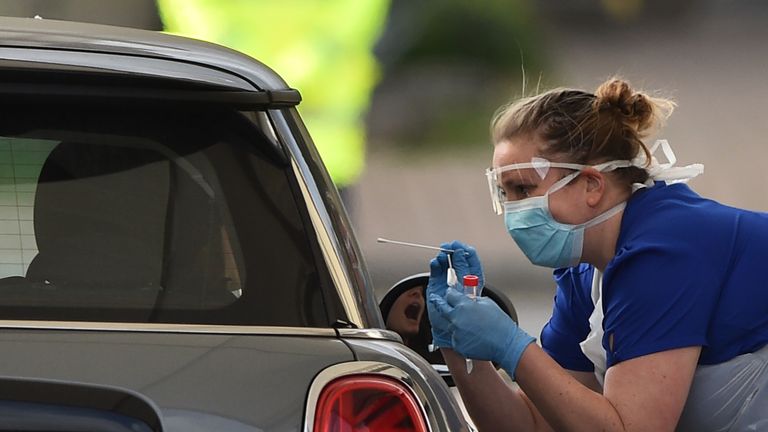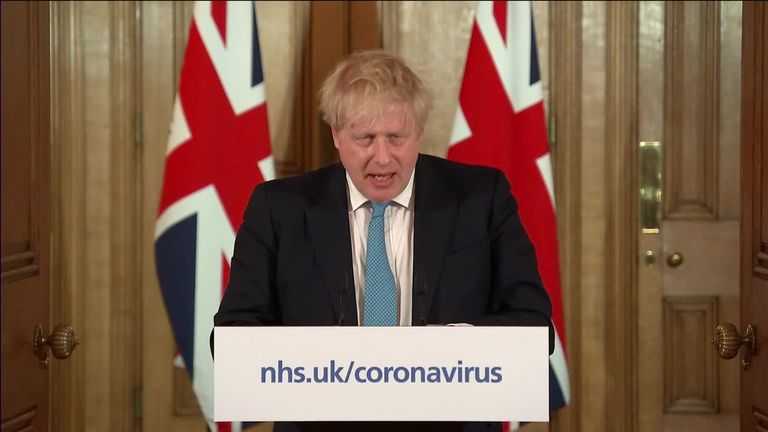Coronavirus: Government rhetoric on testing 'nowhere near matches the reality'
The government said testing would help "turn the tide" against coronavirus but why have they been so slow to do it?
Thursday 2 April 2020 02:40, UK
It was a couple of weeks ago the prime minister declared at his daily coronavirus news conference that he wanted to get to 250,000 tests a day. This would be how Britain would beat the disease.
"We're massively increasing the testing to see whether you have it now and ramping up daily testing from 5,000 a day, to 10,000 a day, to 25,000 and then up to 250,000," he said.
That quarter of a million figure related to two tests: the test to see if you have the disease, and an antibody test which tells you if you've already had it.
Boris Johnson offered these figures up as he told the nation he believed we could "turn the tide" on the disease in 12 weeks if we all followed the rules on social distancing to help slow the spread.
That was our bit of the bargain.
His was to make sure the government was building testing capacity quickly enough to not just protect NHS staff and reduce unnecessary absenteeism, but to better manage the spread and get Britain back to work by working out who'd had the virus already.
"The knowledge of where the virus is will make a huge difference to our management of the disease and our ability to reduce disruption and economic difficulty," the prime minister said as he talked of the possible rapid roll-out of an antibody test "as simple as a pregnancy test" which could determine if someone has had COVID-19.
But nearly two weeks on and the rhetoric nowhere near matches the reality.
The number of cases and deaths are growing at a frightening rate and the government is unable to give us many straight answers to straight questions when it comes to testing.
Alok Sharma, the business secretary, simply couldn't give an answer when asked at the news conference on Wednesday exactly when the government might be able to start rolling out the antibody tests Mr Johnson was promising a couple of weeks ago.
Tests ordered by the government were being "urgently evaluated" but as to when they could be circulated to the wider population to get Britain back on its feet - still unknown.
And the government has even been struggling to use all the limited capacity it does have.
Of the 12,750 test capacity it had on Wednesday, 10,426 tests were carried out.
One clear factor has been the government's edict - now lifted - that only up to 15% of NHS staff could be tested for COVID-19 in order to ensure there was capacity for those taken to hospital to be tested.
Just over 2,000 NHS frontline staff have been tested - a drop in the ocean of the estimated 125,000 who are currently off work due to symptoms or because they are self-isolating.
This is a terrible waste of resources at the most critical of times.
At the news conference on Wednesday, Public Health England's Yvonne Doyle said the number of tests would be scaled up in the coming weeks with capacity now for almost 3,000 daily coronavirus tests for NHS, which will grow as the government moves to its 25,000 target.
Professor Doyle also said a "second strand" of testing was coming on stream in five drive-through centres, in which people could be tested in order of priority.
The centres are currently testing NHS staff to see if they have the virus, but could also be used for the simple antibody tests - which take only minutes to administer - once they come on stream.
"Our intention is to get to thousands, to hundreds-of-thousands, in the coming weeks," she said.
But time is exactly what we don't have as the UK approaches the peak of the coronavirus epidemic.
Hospitals are now admitting 1,000 new coronavirus patients a day; the number of deaths are doubling every three days; there are now over 25,000 cases across the country.
The prime minister is acutely aware that if he doesn't deliver on this promise to ramp-up testing - particularly for NHS staff putting their lives on the line - then public support for him and his government's handling of the crisis could begin to fall away.
That perhaps explains why Mr Johnson issued an impromptu video message from his No 11 bunker on Thursday night to reassure the public that he was still in the driving seat and would deliver on testing.
He said: "We are massively increasing testing. And I want to say a special word about testing because it is so important and I have said for weeks and weeks that this is the way through. This is how we will unlock the coronavirus puzzle. This is how we will defeat it in the end."
Repeating his promises from two weeks ago again.
Now the clock is really ticking on the delivery.







